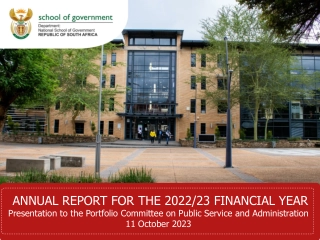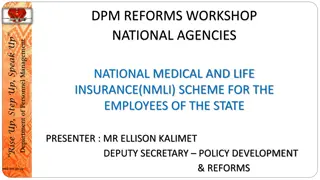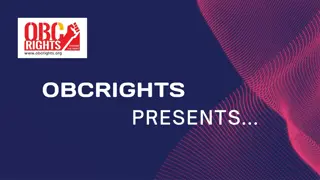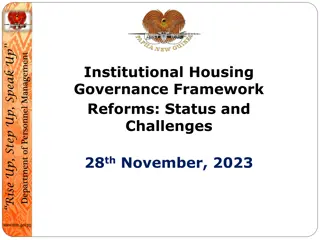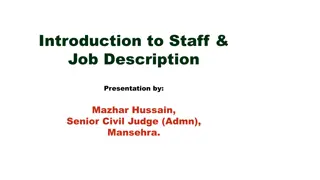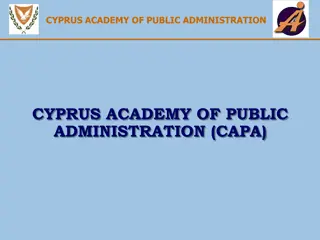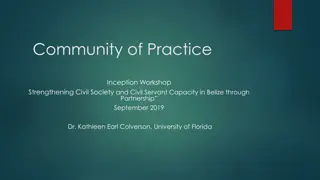Educating Civil Servants
Empowering civil servants through education on respecting human rights and combatting stigma against LGBTQ+ individuals is crucial for fostering a more inclusive society. Addressing ethical aspects, professional norms, and medical ethics ensures quality care and upholds dignity for all. Discussions delve into actions that underpin ethical principles, examining if they are enshrined in official documents. The focus is on promoting tolerance, ensuring confidentiality, and enhancing professionalism in healthcare settings.
Uploaded on Feb 25, 2025 | 0 Views
Download Presentation

Please find below an Image/Link to download the presentation.
The content on the website is provided AS IS for your information and personal use only. It may not be sold, licensed, or shared on other websites without obtaining consent from the author.If you encounter any issues during the download, it is possible that the publisher has removed the file from their server.
You are allowed to download the files provided on this website for personal or commercial use, subject to the condition that they are used lawfully. All files are the property of their respective owners.
The content on the website is provided AS IS for your information and personal use only. It may not be sold, licensed, or shared on other websites without obtaining consent from the author.
E N D
Presentation Transcript
Educating Civil Servants About Issues of Respecting Human Rights and Tackling Stigma and Discrimination in Relation to Gays, Other MSM, and Trans* People
Block 3 Tolerance and Political Correctness in the Activity of Medical Facilities Aim: To increase the levels of tolerance of healthcare workers in relation to gays, other MSM, and trans* people, in particular in the area of HIV-services.
Sexual-Gender Model of an Identity Additional Constituents Main Constituents Gender identity Level of sexuality expression Sexual identity Sexual conduct Sexual Orientation Sexual disorders Biological sex Gender expression
Structure of Professional Ethics Common norms: Types of professional ethics: pride medical diligence pedagogical honor research ethics obligations journalistic duty service sector ethics conscience and others
Aspects of medical ethics informing the patients about the state of their health and their rights humane attitude respect for human dignity, autonomy and the right of choice, the right to reject medical services included qualitative and immediate aid prevention of harm
Aspects of medical ethics expressing care for the dying securing professional secrecy professional competence respect for the profession and colleagues participation in the enlightenment of the population unbiased attitude towards the client, their life values and beliefs
Questions for discussion What does each of these ethical aspects mean? What specific actions underpin them? Are they enshrined in any documents or norms? Is control of the obedience to these principles possible?
Principles of Confidentiality in Healthcare it is forbidden to divulge information without the patient s prior consent research results are presented expressly to the patient personally the observation at the doctor s should be excluded from any outside intrusion
Principles of Confidentiality in Healthcare securing medical secrecy it is forbidden to discuss patients with other healthcare workers or third parties the healthcare professional may disclose information about the client without their consent only in cases defined laws and other regulations
Tolerance in healthcare comprehension of the patient s identity without negative thoughts about their peculiarities, conduct or lifestyle respectful attitude. high culture of communication increased attention during the discussion of the patient s problems or while surveying them
Life quality factors income bad habits nutrition accommodation comfort sleep ecology sports healthcare services work-rest balance etc.
Political Correctness Is a practice of direct or indirect prohibition to use words and phrases that are deemed insulting for certain social groups.
Euphemisms A word or a descriptive saying neutral in its sense and meaning that is usually used in texts and public speeches to substitute those that are deemed indecent or inappropriate.
Neologism Is a word, meaning of a word or a word combination that has appeared in a language recently.
Femini tives
Fixed phrases Stable words or expressions, translation from foreign languages. As a rule, diverse slogans, words, and expressions are meant in this case that are related to the protection of rights of LGBT-communities, HIV+ persons and other social groups.
Correct medical questions Are you involved in a romantic relationship? Do you have a sexual partner? What is your partner s gender identity? What types of intimacy do you practice? How may I address you? How may I call you? What is the pronoun of your choice?
Politically correct and appropriate expressions Incorrect or inappropriate expressions Homosexuality Homosexualism Homosexualist Homosexual Homosexual orientation, Homosexuality, Bisexual orientation, Bisexuality, LGBT, LGBT-community Nonstandard sexual orientation
Incorrect or inappropriate expressions Politically correct and appropriate expressions LGBT-community, LGBT Lesbians, gays, bisexuals, trans* people, People of gender and sexual diversity Sexual minorities Gay, bisexual Homosexual man Bisexual man Sodomite, homosexual, faggot, and others Trans* person, Transgender man, Transgender woman Trans/tranny
Incorrect or inappropriate expressions Politically correct and appropriate expressions Intersex, Intersex people Intersex community Hermaphrodite Heterosexual Straight, normal Equal rights/ Equal protection Human rights Special rights, gay rights MSM - men who have sex with men WSW - woman who have sex with women These abbreviations are usually used only in the healthcare field, in particular, in the lexicon of HIV- prevention service programmes
Social tolerance Patience to other worldviews, lifestyles, conduct and customs, religious beliefs, nationality, state of health, etc.
Characteristics of a tolerant person acknowledgment of all people being equal in their rights candour and patient attitude respect for cultural, religious, language and other differences cooperation and solidarity while solving common problems positive attitude to others, those who are different, not like you
Steps toward tolerance Legal education Personal cultural competence Discussion Unity Lobbying Leader
Best practices Policies on equality and non-discrimination at the workplace Inclusion of the notions of LGBTI identity and LGBTI families into the policies of healthcare facilities Inclusion of an LGBTI identity into questionnaires, surveys of initial observation and clinical charts Including information about the health of the LGBTI into medical bulletins and other distributive informational materials Educating the medical staff about the peculiarities of consulting the LGBTI-patients
Best practices Keeping the LGBTI needs in mind while considering the scope of medical services Including the LGBTI among the medical staff Appraising the quality of medical services by means of surveying the LGBTI patients Adjust the cooperation with NGOs that provide services and aid to gays, other MSM, and trans* people, including the integration of an effective system of assistance and redirection
Thank you for your attention! Trainer s name
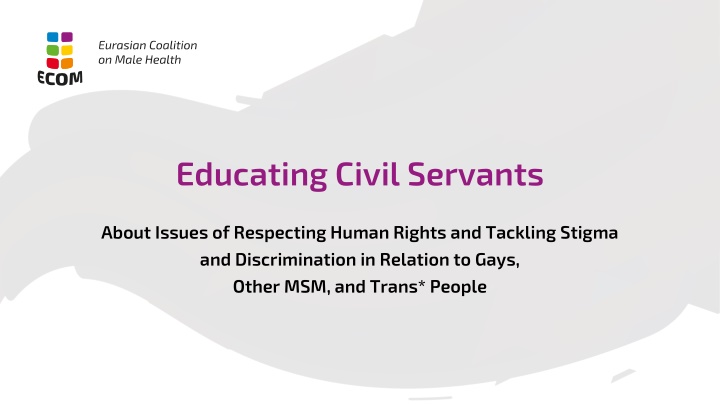

![❤[PDF]⚡ Civil War Talks: Further Reminiscences of George S. Bernard and His Fel](/thumb/20551/pdf-civil-war-talks-further-reminiscences-of-george-s-bernard-and-his-fel.jpg)
